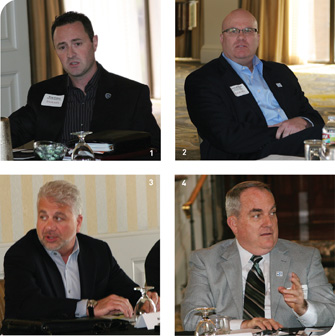
1. Greg Cotton said the Google Fiber project was yet another unique opportunity for the Kansas City area. | 2. Funding holes in the region’s product, said Brett Mitchell, would be critical as other communities do the same in their markets. | 3. Bill George said the region’s geographic reach made it imperative to find ways to connect its assets. | 4. Tom Holden said that the issue of connectivity still needs to be addressed.
Kathy Nelson, CEO of the Kansas City Sports Commission, seconded the need to showcase the city. “I think there’s a lot of synergy within our city,” she noted. “We can continue to grow, which then allows us to showcase ourselves as well.”
Bill Dietrich, with the Downtown Council, believes that Kansas City has passed the awareness tipping point already. He mentioned the city’s listing on Forbes magazine’s Top 10 best downtowns in America, and its citation as one of only 10 choices worldwide—and the only one in the United States—in Frommer’s “Top Destinations 2012.” Said Dietrich, “What we need to be talking about is how do we seize this opportunity.”
Challenges
“It’s awesome when you think about what we have here,” said Rick Hughes. “The flip side is that we just can’t allow ourselves to become complacent. It’s not necessarily building bigger, more—it means finding a better way to express that story, or finding a better way to manage and govern what we’re doing.”
Bill Chapin, senior vice president for business operations with the Kansas City Chiefs, sees a need for people “to get over our self-inflicted behavior that we’re not good enough.” This is part of the message that he has been pulling from the focus groups that the Chiefs have been running. That said, the focus groups provided some positive insight into the local zeitgeist. “Kansas Citians take great pride in their city and are looking for opportunities to celebrate their community,” said Chapin.
For Greg Cotton, chief operating officer of Sporting Kansas City, one concern is the ability of the area to capitalize on the many new opportunities. The one opportunity that most interests him is Google’s decision to make the two Kansas Cities, Missouri and Kansas, a beta site for its new ultra high-speed fiber network. “It’s an amazing opportunity to capitalize on,” said Cotton. “We’ll have an infrastructure that no other city on the planet will have.”
Brett Mitchell, general manager of the Overland Park Convention Center, observed that other cities are attempting to do much of what Kansas City has done. He added that some at least are willing “to fund the holes that they have in their product.” He wonders whether Kansas City has the will to do the same.
“The greatest threat that we face,” said Nick Benjamin in the day’s most succinct quote, “is acceptance of the status quo.”
Transportation
Undeniably, one of the challenges Kansas City faces is connectivity. Beginning with the development of the Country Club Plaza 90 years ago, every major development in Kansas City has been designed to accommodate the automobile. With 30% more freeway miles per capita than any city in the world—and thus, less traffic congestion than almost any other city in America—it seemed altogether natural to make attractions easily accessible to the highways and provide them with plentiful space for parking, usually free.
“Obviously something near and dear to me is the connection between all of those assets,” said Bill George, CEO of Kansas City Transportation Group. George observed that if you take the benefits of Kansas City and put them on a blank sheet of paper without a title, most everybody would want to go visit that city. “Because we’re so spread out, because we don’t have an effective link between those attractions,” he added, “we’re not getting everyone.”
“We are spread out,” acknowledged Tom Holden, director of the Hotel and Lodging Association. For visitors without autos, that dispersal makes it hard to get to different places. This is an issue that he and other believe needs to be addressed.